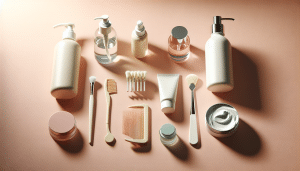Discover Rituals That Transform Skin and Mind
Natalie Brooks November 8, 2025
Unlock the synergy between beauty rituals and holistic wellness. Explore how mindful routines, natural skincare, and self-care can elevate your mood and appearance, creating harmony inside and out. This guide shares researched insights and practical steps for anyone interested in radiant skin and everyday well-being.
Mindful Approaches to Everyday Beauty
Rituals are more than routines. Incorporating mindfulness into skincare and beauty rituals can shift them from daily chores into moments of grounded self-care. For many, the simple act of cleansing the skin with attention becomes a grounding practice that soothes both the body and the mind. The concept of mindful beauty has expanded in recent years as research confirms its positive effects on mood and mental clarity. Studies from reputable institutions have shown that simple, intentional actions—like massaging facial oils or practicing deep breathing while applying moisturizer—can help lower daily stress and improve one’s connection to their body. Mindfulness doesn’t require complicated steps. It’s about bringing presence and calm to your rituals, starting with small changes that anyone can introduce.
Beauty aficionados and wellness experts often discuss the concept of ‘slow beauty.’ This movement advocates for patience, high-quality ingredients, and pausing to enjoy each step of self-care. Instead of rushing through skincare or makeup, slow beauty encourages setting aside distractions, allowing each product to connect with your senses and skin. This approach not only nurtures the skin but also calms the nervous system. According to research, slow, rhythmic activities can help regulate heart rate and reduce tension, highlighting the direct link between outer beauty regimens and inner tranquility (https://www.psychologytoday.com/us/blog/the-moment-youth/202002/why-rituals-work).
Mindfulness within beauty rituals fosters a sense of agency and self-worth. When each skincare or grooming step is performed with care, it signals to the mind that you are invested in your own well-being. This act of self-respect has a cumulative effect, building confidence and emotional resilience over time. It can begin as simply as noticing the sensation of water on your face in the morning or sitting quietly for one minute before starting your beauty routine. Mindful rituals, when practiced consistently, offer benefits far beyond the mirror, boosting not only appearance but also holistic wellness.
Natural Skincare: More Than a Trend
A growing curiosity about natural skincare ingredients is reshaping the beauty landscape. Consumers seek products with fewer synthetic chemicals and more plant-based ingredients, prioritizing effectiveness alongside sustainability. This shift aligns with research emphasizing the skin barrier’s health and the long-term impact of ingredients absorbed through the skin. Botanical extracts, cold-pressed oils, and minerals are widely recognized for their gentle efficacy and minimal risk of irritation. Choosing natural skincare not only supports personal wellness but also environmental stewardship, as these products often involve eco-friendly harvesting and packaging practices.
There’s science behind this preference for natural skincare. Studies referenced by the Environmental Working Group reveal that some synthetic additives, fragrances, and preservatives may potentially disrupt sensitive skin or the body’s endocrine system. In contrast, plant-based alternatives often provide antioxidants, vitamins, and anti-inflammatory properties, contributing to smooth, resilient skin. Of course, not every natural ingredient works for everyone, and patch-testing is always encouraged. However, reviewing ingredient lists and researching product backgrounds can empower informed choices and promote safer, healthier skincare habits (https://www.ewg.org/skindeep/).
Ethical sourcing is a central concern for many engaged in wellness and beauty. Brands that are transparent about their supply chains and prioritize fair-trade ingredients or cruelty-free manufacturing practices are highly valued in the market. This consciousness extends beyond personal interest. Supporting ethical brands is another way rituals can contribute to larger social and planetary well-being. Rituals grounded in natural ingredients link the health of the self with that of the community and planet, creating a virtuous cycle of wellness.
Holistic Wellness Through Daily Self-Care
Self-care is often viewed as an indulgence, yet wellness professionals highlight its necessity. Holistic wellness routines consider not just the surface—like glowing skin or shiny hair—but also sleep quality, hydration, nutrition, and emotional balance. When integrated into daily life, small acts like a gentle facial massage, herbal tea sipped mindfully, or five minutes of stretching can add up to noticeable improvements in both mood and appearance. Regular self-care helps build consistency, which is foundational to lasting change. According to the National Institutes of Health, self-care routines can lower the risk of chronic stress and related health concerns (https://newsinhealth.nih.gov/2020/05/importance-self-care).
Personalized routines enhance holistic wellness even further. No two people are alike, and customizing self-care allows for a targeted approach. Some may find a morning gratitude meditation energizes their day, while others rely on evening routines to transition to restful sleep. Journaling, sound baths, aromatherapy, or simple breathwork can be adapted and layered for unique needs. Studies show that people who personalize their wellness rituals report greater satisfaction and stick with routines longer than those who adopt a generic regime. Holistic wellness is thus sustained by adaptability and attentive self-observation.
Daily self-care also nurtures emotional health by fostering a positive relationship with oneself. Devoting a few moments each day to activities that feel nourishing creates a sense of ritual and belonging. Over time, these practices can help reframe the mind’s focus—shifting from external validation toward internal affirmation and gratitude. Emotional wellness blossoms from daily habits, reinforcing the connection between a healthy mind and radiant appearance.
Enhancing Mood with Beauty Routines
Beauty rituals have more influence on emotions than many might realize. Psychologists and wellness coaches note that familiar, comforting routines can serve as anchors during unpredictable times. Applying a favorite facial mask, painting nails, or even brushing hair can trigger the brain’s reward pathways, releasing dopamine and creating a sense of pleasure. This chemical response can help stabilize emotions and promote resilience against daily stress.
Even brief beauty routines offer an opportunity for creative expression. Choosing playful colors, experimenting with new hairstyles, or learning simple makeup techniques can provide a boost of novelty and fun. Research from the American Psychological Association links creativity and playfulness to improved mental health and stress management. These simple moments of play can make beauty routines both joyful and energizing, particularly during periods of routine fatigue or emotional challenge (https://www.apa.org/news/press/releases/2016/03/creativity-stress).
For some, beauty routines are also a way to reclaim a sense of control over their daily lives and environments. In times of uncertainty, the predictability of caring for the skin, hair, or nails creates a grounding sense of order. Researchers suggest that these rituals help reinforce a positive self-image, leading not only to personal satisfaction but also positive interactions in social and professional settings. Thus, beauty routines extend their benefits into multiple spheres of everyday life.
The Role of Sleep and Nutrition in Beauty
Beauty does not exist solely in creams and serums—quality sleep and good nutrition are essential foundations for radiant skin and a bright mood. Evidence abounds that sleep deprivation can accelerate skin aging, increase puffiness, and diminish the skin’s natural glow. During deep sleep, skin cells repair, collagen is regenerated, and inflammation subsides. Establishing an evening wind-down routine—such as dimming lights, applying nourishing night cream, and disconnecting from screens—can help signal to the body that it’s time to repair and rejuvenate.
Nutrition is another pillar of both beauty and well-being. Diets rich in antioxidants, healthy fats, and hydration support cell regeneration, helping the skin remain elastic and luminous. Omega-3 fatty acids, vitamin C, and beta-carotene have been highlighted by the Harvard T.H. Chan School of Public Health for their positive impact on skin health. Whole foods—like berries, leafy greens, salmon, and nuts—offer essential nutrients that topical products alone can’t deliver (https://www.hsph.harvard.edu/nutritionsource/skin-health/).
Developing consistent habits around rest and nutrition is a ritual in itself. Simple steps—such as mindful eating, drinking enough water, and sticking to a regular sleep schedule—are the building blocks of authentic beauty. By viewing these habits as extensions of aesthetic care, individuals can experience deeper harmony between appearance and overall vitality.
Integrating Modern Science with Ancient Rituals
Today’s beauty and wellness enthusiasts blend evidence-based science with timeless self-care practices. Rituals inspired by global traditions—like Japanese double cleansing, Nordic dry brushing, or Ayurvedic oil massage—are adapted with the support of modern dermatology and psychology. Researchers from Johns Hopkins University note that combining the wisdom of ancient cultures with empirical study can yield optimal results for both well-being and radiance (https://www.hopkinsmedicine.org/health/wellness-and-prevention/the-benefits-of-self-care).
Technology has made it simpler to track wellness markers—like hydration levels or skin texture—at home. Apps now guide mindfulness meditations, log skincare progress, and encourage daily reflection. This convergence allows for a unique approach where historical wisdom and personalized feedback foster sustainable routines. Yet, despite technological advances, the core principle remains unchanged: beauty thrives when rituals are performed with intention and care.
Embracing both science and tradition encourages a broader view of wellness rituals. Whether through high-tech tools, botanicals, or simply pausing for gratitude, every ritual has the potential to transform not just one’s appearance, but their daily experience. As the definition of beauty expands, so does the array of empowering, accessible, and individualized approaches to self-care—each supported by both modern research and ancient insight.
References
1. Psychology Today. (n.d.). Why rituals work. Retrieved from https://www.psychologytoday.com/us/blog/the-moment-youth/202002/why-rituals-work
2. Environmental Working Group. (n.d.). Skin Deep Database. Retrieved from https://www.ewg.org/skindeep/
3. NIH News in Health. (n.d.). The importance of self-care. Retrieved from https://newsinhealth.nih.gov/2020/05/importance-self-care
4. American Psychological Association. (2016). Creativity counters stress. Retrieved from https://www.apa.org/news/press/releases/2016/03/creativity-stress
5. Harvard T.H. Chan School of Public Health. (n.d.). Skin health. Retrieved from https://www.hsph.harvard.edu/nutritionsource/skin-health/
6. Johns Hopkins Medicine. (n.d.). The benefits of self-care. Retrieved from https://www.hopkinsmedicine.org/health/wellness-and-prevention/the-benefits-of-self-care








